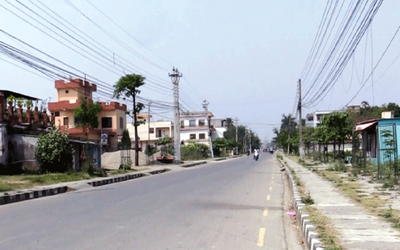As Nepal is celebrating the World Water Day, BISHWA PRAKASH PANDIT, secretary of the Water and Energy Commission, who is also the chairman of the World Water Day Celebration Committee, spoke to NEW SPOTLIGHT about various issues. Excerpts:
As Nepal has been celebrating the World Water Day by organizing various programs, how do you look at the importance of the slogan of “Water and Food Security” in Nepal's context?
As we all know, the entire world celebrates the World Water Day on March 22 every year. Each year, an important theme or slogan on water is developed and, accordingly, various programs are organized. Despite the potential of irrigation on its farmland, Nepal is importing food. Nepal requires year-round irrigation to increase cropping intensity and thus increase production to cater to the ever growing demand of food to its people. Further, this will reduce dependency on food from other countries. Therefore, the slogan "Water and Food Security" for 2012, is very appropriate and relevant in Nepal's context as well.
The Water and Energy Commission Secretariat (WECS) is a think tank organization providing necessary support to the government in dealing with water related policies. How do you look at the present state of WECS?
We agree that WECS is the think tank of the government. It provides recommendations and suggestions to the government on water and energy issues. WECS is always preparing itself to address the challenges arising in water and energy sectors. Regular study and research are conducted to enhance the capacity of WECS. At present, WECS is working with full dedication and determination as per the mandate provided by the Government of Nepal to develop water and energy sector.
As Nepal is going for a federal setup, what role can WECS play in the new situation?
At this moment, we are aware that the country is adopting the federal structure; however, we do not know yet, how the federal states will be demarcated. Water is one of the important resources of the country and it would be important for the states too. Various questions will arise among the federal states in sharing benefits of water resources, for example, how these precious resources will be divided, who will own, who has the right to use, administer etc. Certain cases of disputes among federal states in water sharing are being observed in some countries. From WECS' perspective, considering the technical aspects and nature of water flow, river basin approach needs to be adopted for sustainable development of water resources. This approach will help the country to develop and also minimize the conflicts between or among the states for water resources. In that context, WECs can play more important role after the country functions as a federal country.
Has the split of Water Resources Ministry into two affected the mandate of WECS?
The mandate of WECS has not been changed after forming Ministry of Irrigation and Ministry of Energy. Like in the past, WECS is conducting study and research, which, in turn, provides feed-back for formulating policies and strategies. Further, various sectoral policies related to water and energy require harmonization to address overlapping mandates, roles and responsibilities. In this regard, WECS is currently formulating Integrated Water Resources Policy and National Energy Strategy.
WECS prepared Nepal's water resources strategy a long time back. How do you see its relevance now?
The Water Resources Strategy (WRS) was prepared in 2002 and further in 2005, National Water Plan was formulated to implement the activities defined by WRS. After 1990, the development and management approach in water resource has been shifted from sectoral, supply oriented to holistic and demand driven. Planning process has been initiated in river basin perspective. The WRS adopted the principles of Integrated Water Resources Management (IWRM) for development and management of water resources of the country and the IWRM principle is equally valid to-date. It is therefore, the WRS is very relevant; however, it is almost a decade since it was formulated and hence it require review as well as updating.
Climate change is going to affect Nepal's Himalayas and water basin. As a policy level institution, how can WECS contribute to meet the challenges?
For the past several years, water experts, academia, researchers are focusing on identifying the climate change impact and adaptation measures. It is realized that rigorous efforts are required to examine the climate change effects. Recognizing this fact, WECS has recommended establishing the Himalayan Climate Change Center through Water Resources Strategy and National Water Plan. WECS is emphasizing on quantifying the climate change effects in the water resources so that activities related with water resources development and management can accommodate those effects. In this course, the upcoming program is to acquire data, analyze and provide the information on flow of water in time and space due to climate change effect. The information will be disseminated through the newly established water resources information center in WECS.
Besides formulating policies, what are other areas of WECS?
WECS implements action research in water and energy sector in collaboration with National, International, bilateral and multilateral agencies. Currently, Koshi River Basin Management Project is going on in partnership with WWF Nepal. Similarly we are working jointly with ICIMOD on the study of effects of climate change in cryosphere (snow and glacier lake). Our organization also acts as a coordinating agency for conducting study and research on various water and energy issues. WECS is the member of World Energy Council (WEC) as well as International Commissions on Large Dams (ICOLD) and it is also working as a secretariat of the both organizations' Nepal National Committee.
Nepal has been facing severe power and water crisis, what role has your organization been playing to find out a long term solution?
It is well understood that, the long term solution for power in Nepal is to develop hydropower. Development of hydropower is also not an easy task. A number of variables should be addressed. WECS has provided an array of hydropower projects with timeline, through National Water Plan. However, because of various reasons, except a few, others are not materializing yet. Ministry of Energy is working on that. We believe Seti (Damauli) reservoir project will go into construction from the next year. Similarly other storage projects like West Seti, Budhi Gandaki, and Nalsyagu Gad will be implemented. Subsequently power crisis could be managed in coming years.
How much do other ministries incorporate the recommendation and suggestion given by WECS?
The ministries and departments working in water resources have adopted the Water Resources Strategy and National Water Plan as the guidelines for development. However, the target has not been achieved as anticipated. WECS believes that the recommendations and suggestions have been well taken by other government agencies.
How do you evaluate the role of WECS?
WECS plays an important role in the government system. The outcome from study and research conducted is continuously providing the prerequisite for the decision makers to take decisions. There is a need to enhance the capacity of WECS by providing both the technical and financial resources so that it can play its role even more effectively.
There are frequent changes in the secretary and other officials at WECS. How do you look at this?
Change of officials in bureaucracy is a regular process. It should be the system that operates not an individual. If the system works properly, it does not matter who comes. I consider transfer as a normal process. We believe WECS should be developed as a professional institution.
What is your own experience in working at WECS?
I feel honored to work in this organization. During my tenure here, I will try to drive this organization with my full capacity and prove the importance of this organization for development of water and energy sector of the country.
- TANAHU HYDROPOWER PROEJCT: A Significant Achievement
- Apr 15, 2024
- AMBASSADOR HANAN GODAR: Sharing Pain With A Nepali Family
- Mar 30, 2024
- VISIT OF KfW AND EIB TO NEPAL : Mission Matters
- Mar 25, 2024
- NEPAL BRITAIN SOCIETY: Pratima Pande's Leadership
- Mar 24, 2024
- NEPAL ARMY DAY: Time To Recall Glory
- Mar 15, 2024
















